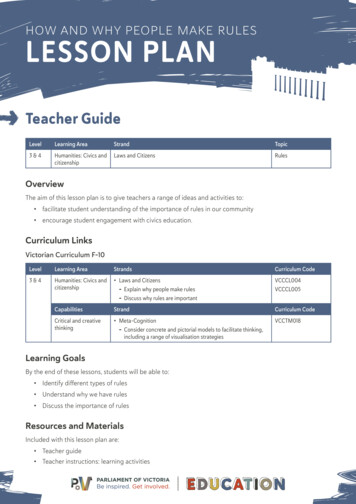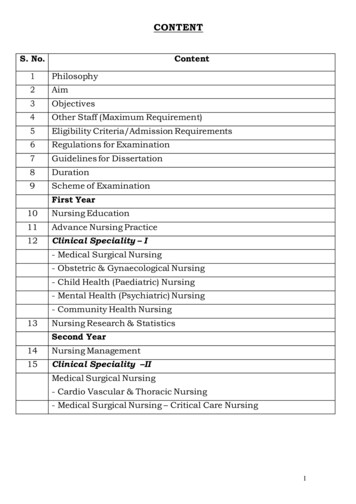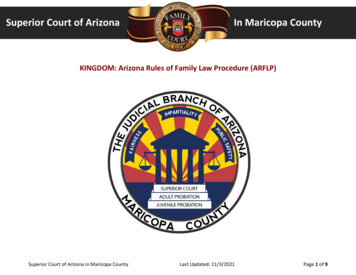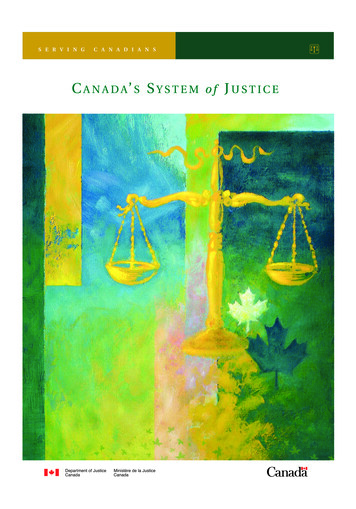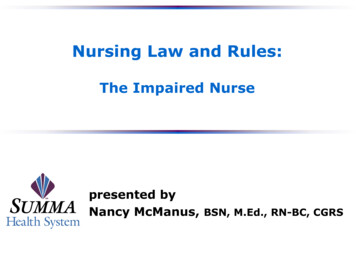
Transcription
Nursing Law and Rules:The Impaired Nursepresented byNancy McManus, BSN, M.Ed., RN-BC, CGRS
Disclosures/disclaimers I am not a lawyerThis presentation is not meant to offer legal advice. Ifneeded, please consult an attorney with expertise in thisarea. The planners and speaker have no conflicts of interest orbiases to declare. One contact hour of Category A continuing nursing educationwill be awarded to those who attend 80% of this program andsubmit a completed evaluation form. This program is not coprovided. There is no commercialsupport or sponsorship.2
Stories We know stories but seldom discuss them Any red flags here? Joe, a PACU nurse, is 30 minutes late minus his tankard ofcoffee – you detect the odor of alcohol and wonder abouthis brand of mouthwash or cologne Rose, an ortho nurse with 2 years experience but new toyour hospital, asked to work night shift, offers to pass allmeds for all three teams freeing up others to take newadmits Dee, an ED nurse for 20 years, has had many personalcrises lately; charting has become illegible, work habitshave declined; defensive when questioned about inability tofinish her required QI duties; missed work 7 times in thelast month due to “illness”3
More stories Janet, a nurse for 4 years, doesn’t seem to care much abouther appearance anymore, has been in a daze most of hershift. Dave’s patient told you, when you answered the call light,that she didn’t get any pain relief from the shot shereceived over an hour ago. When you find Dave, he iscoming out of the bathroom with a syringe in his hand. Two oncoming night shift nurses show up to report moreanimated than usual. In conversation they admit that theyboth came directly from a going-away party at Applebees.They both admitted to drinking but said they’d have extracoffee to “balance their chemicals”.Any concerns?4
Impaired nurse - definition Is it just drug diversion or something more? Only street drugs? Easily recognized? Drug addiction is voluntary? Short term treatment is all that is needed?5
Impaired nurse - incidenceSubstance abuse occurs across all generations,cultures, and occupations. Nurses are not athigher risk than the public sector.One in 10, or 10-15%, of all nurses may beimpaired or in recovery.Nurses in certain stressful specialties are moreprone to substance use – ED and critical carenurses are 3 times as likely to use cocaine andmarijuana as nurses in other specialties.6
Impaired nurse Becomes dysfunctional in ability to provide safe,appropriate patient care. Concerning because addiction is a disease yet theaddicted nurse remains responsible for actionswhen working. Practice with a questioning attitude – you need toknow what signs and symptoms should set off analarm in your mind.7
Signs/symptoms Brief, unexplained absences from the nursing unit Rounding at odd hours Med errors Isolation from peers Mood changes after meals/breaks Frequent reports from patients of lack of pain relief Narcotic/Pyxis obsession, offering to medicate coworkers patients8
Wasted narcotics attributed to a single nurse Increased narcotic sign-outs Discrepancies with the narcotic record and/or thepatient record Altered verbal or telephone med orders Decreased quality of care, documentation; arrivinglate to work and asking to leave early9
Physical signs Shakiness, tremors, fatigue, slurred speech Frequent use of mouthwash, gum, or breath mints Watery eyes, constricted/dilated pupils, frequentrunny nose Diaphoresis Unsteady gait Frequent nausea, vomiting, diarrhea Weight gain or loss Change in grooming10
Behavior changes Frequent mood changes, outbursts of anger, defensiveness Inappropriate laughter, hyper/hypoactivity Lack of concentration, blackout periods Justify the addiction to ‘relax’, ‘need to escape reality’ Cold weather clothing in warm weather to hide track marks Frequent accidents or emergencies Personal relationship issues Insomnia, frequent complaints of pain Denial of a problem, frequent lying Decreased judgment in/of their own performance11
When to act Is suspicion enough? Should fear of reprisal keep you from reporting? Nurses have an ethical and moral duty to patients,colleagues, the profession of nursing, and thecommunity to take action.12
Consider the following: Do not ignore poor performance Do not lighten or change the nurse’s patient assignment Do not accept excuses Do not allow yourself to be manipulated or fear confrontinga nurse if patient safety is in jeopardy13
What to do As a peer nurse14
What to do As a manager15
What the OBN will do Discipline16
What the OBN will do Diversion17
What the OBN will do PIIP18
Treatment19
Resources The Impaired Nurse Resource Center available laceSafety/Work-Environment/impairednurse Peer Advocacy for Impaired Nurses, LLC available atwww.peeradvocacyforimpairednurses.com Ohio Revised Code 4723 Nurse Practice Act availableat http://codes.ohio.gov/ORC/4723 Nursing Rules from the OBN available athttp://codes.ohio.gov/OAC/472320
Substance abuse occurs across all generations, cultures, and occupations. Nurses are not at higher risk than the public sector. One in 10, or 10-15%, of all nurses may be impaired or in recovery. Nurses in certain stressful specialties are more prone to substance use - ED and critical care nurses are 3 times as likely to use cocaine and






